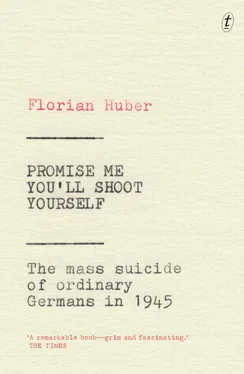Distraught, she returned to the fur shop and called the children. The three of them packed their bags—a small suitcase of groceries, cognac and cigarettes for bartering, and a larger suitcase containing good clothes, an eiderdown and the children’s photo albums—and prepared to flee the town. They hid the valuables they couldn’t carry in the cellar, along with the medals and military decorations from the shop. Then they tied everything to the luggage racks of their bicycles. Throughout all of this, Marie Dabs didn’t for a moment forget that she was the furrier’s wife: ‘I had on my dark-grey tailor-made suit, a red-and-white blouse and a pair of stout shoes, and carried my two fur coats over my arm.’ She cast a last look around the familiar rooms, taking in the white sales cabinets, the racks of shirts and ties and caps, and the fur room with its white wardrobe full of fur coats and muffs.
Just as they were about to set off, the youngest daughter of the local cinema operator, Herr Feindt, came running up and told them that her father had died of a heart attack. No one had been able to save him. Frau Feindt and her three daughters ended up leaving the dead man behind in their flat and fleeing towards Lake Kummerow. Meanwhile, Marie, Nanni and Otto Dabs pushed their bikes down to the harbour and over Kahlden Bridge in the flood of soldiers and fleeing people.
• • •
That same day, Gustav Skibbe noted in his war journal that his unit was to abandon its garrison. No final battle in Demmin. The Wehrmacht was clearing all its bases. To his delight, Skibbe received an extra vehicle ‘for withdrawal purposes’. After a sleepless night, he drove to the army’s food stores, where the liquidation of the base was well underway. Broken and emptied packing cases were strewn all over the place. Meat, cigars, schnapps. Soldiers and civilians were carting off sacks of potatoes and whole cartons of cigarettes, snapping and shouting at each other, tearing the loot out of each other’s hands and laying into one another. ‘Murder. Manslaughter,’ Skibbe wrote. He packed what he could for himself and the men in his unit. It was a ‘hasty retreat’ rather than an orderly withdrawal. The first aircraft buzzing the town, the first dead. The war had finally reached Demmin. It was 29 April. ‘Mum’s birthday,’ Skibbe wrote. ‘What gloomy thoughts drift out to her. Office cleared amid bombing, low-flying aircraft—several deaths among refugees. Rush hour—one unit came flooding back, a hideous to-do. Moved overnight to bridge by harbour. No one to be allowed out.’
Retreating without a fight had its price. Civilians were surrendered to the enemy with no means of defence. Residents and refugees alike were prevented from leaving town on the roads west so as not to hold up the withdrawing army. The soldiers began their retreat over the Peene. Once on the other side, they would blow up the bridges.
• • •
Irene Bröker and her companions had chosen the worst possible moment to break their journey. The day of respite in the abandoned house by the cemetery almost proved their undoing. The Waffen SS searched the house, looking for deserters and traitors; Dr P. managed to hide under the bed just in time. The military police—known derisively as the ‘chained dogs’ because they wore big metal gorgets round their necks—had only a cursory look round.
Bröker later remembered how strange the house felt after they’d left:
The telephone in the house suddenly stopped working. It had gone eerily quiet. We wanted to go on our way and hoped no one else would show up now that the house had been searched. We didn’t want to end up in the ditches that had been dug around the town.
As they were cramming their suitcases back in the car, some women passed and told them that the SS had blocked the bridges. Irene Bröker felt a sudden chill. She cursed the army for commandeering the main routes west for military vehicles. She and her family had been forced to make a detour north to the Baltic as they fled, travelling on congested back roads. If they’d headed straight for the west, she thought, they could be in Mecklenburg by now, which was presumably in British hands. They’d be safe. ‘But there we were in late April, caught in Demmin as if in a trap.’
• • •
Demmin was known as Dreistromland —the land of three rivers. The River Peene rises in the hills of Mecklenburg, about forty kilometres south-west of Demmin, and winds its way down through the plains of Western Pomerania to the Baltic. The Peene is no wild torrent, its banks a bare two metres above sea level at Demmin, its gradient gentle and current sluggish. In a tenacious east wind, the river will give up and flow uphill. Demmin lies on a kind of peninsula in a westward loop of the Peene. Seen from the air, the river forms a blackish green semicircle around the slight hill on which Demmin’s old town is situated—the market square, with the town hall standing solitary in the middle; the proud brick church of St Bartholomaeus; and Luise Gate, the town’s only surviving gatehouse—and sometime prison—with its thick stone walls and gothic stepped gables. In the course of this semicircular loop, the Peene is joined by two tributaries—the Trebel from the west and the Tollense from the east, both sharply meandering little rivers, too. In and around Demmin, these three rivers form a complex network of branches and canals, basins and ditches, pools and marshland. The town’s location at this junction of three rivers once gave it some standing as a seaport. Its red-brick warehouses are quite imposing enough to compete with the church tower.

Demmin seen from the Peene
In late April 1945, Demmin had fifteen thousand townspeople and a few thousand refugees. The bridges had been blocked by Wehrmacht soldiers, who were waiting for orders to dynamite them. From the air, the blackish-green ribbon of the Peene could be seen cutting off the escape routes to the west. From the air, it was obvious: they were all trapped.
• • •
Since 25 April 1945, a hundred thousand Red Army soldiers—the 65th Army of the 2nd Belorussian Front—had been on the final leg of their march from Stettin to the demarcation line between the Soviet and Western Allied occupation zones. Their current objective was to capture the German territory north of Berlin as far as the Demmin-Malchin-Waren line within a fortnight. As the troops advanced, they came across the dwindling remains of the XXXIInd Army Corps, a largely worn-down division of Flemish SS legionaries and a few bedraggled Volkssturm units. Although these soldiers were in no fit state to repel the Soviet tanks and troops, they fought on and inflicted appreciable losses; the Soviets had no reason to regard the fighting and killing as over. They even quickened the pace of their own advance to prevent the retreating Germans from drawing up a new defence line on the Baltic coast.
And so the heavy Soviet tanks and armoured personnel carriers rolled swiftly north-west, along country roads and over fields which the many streams and canals made hard to navigate. They passed through the small towns and tiny villages of Western Pomerania: Altentreptow, Letzin, Alt Teterin—and Hohenmocker, where the foremost brigade spent the night of 29 April. On the following day, the Red Army soldiers were to capture Demmin and then push on rapidly in pursuit of the enemy. Those were their orders.
By this time, Soviet soldiers had been fighting for three years and ten months, or 1409 days, in a war foisted on them by Nazi Germany on 22 June 1941. Under the slogan ‘Crusade against Bolshevism’, the Germans’ eastern campaign was, from the outset, planned as a war of extermination against an inferior race, the Soviet Untermensch . Even before the first shots were fired, the German command had issued to troops a series of orders in clear breach of international law—orders that not only encouraged but actually demanded that they commit crimes against enemy soldiers, prisoners and civilians. It was hardly surprising, then, that the battle was fought from the start with unprecedented ruthlessness and brutality on both sides. Behind the 1600 kilometres of front line, SS units were organising systematic murder operations and the industrial extermination of the so-called enemies of the people. And when the German retreat began in 1943, Wehrmacht soldiers set fire to thousands of towns and villages and fields in the east as part of the ‘scorched earth’ policy.
Читать дальше













